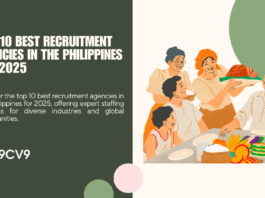Key Takeaways
- Conduct thorough research on the Philippine job market to identify in-demand industries and tailor your job search accordingly.
- Optimize your resume by highlighting relevant skills, quantifying achievements, and customizing it for each job application.
- Build a strong professional network through industry events, online platforms like LinkedIn, and alumni associations to access hidden job opportunities and gain industry insights.
Welcome to our comprehensive guide to finding a job in the Philippines.
If you’re searching for employment opportunities in this vibrant Southeast Asian country, you’ve come to the right place.
The Philippines boasts a diverse job market with abundant possibilities, but navigating through it can be both exciting and challenging.
As you embark on your job search journey, it’s essential to equip yourself with effective tips and strategies to maximize your chances of success.
Whether you’re a fresh graduate eager to kick-start your career or a seasoned professional seeking new opportunities, this blog post will provide you with valuable insights and actionable advice to navigate the Philippine job market with confidence.
The Philippines, known for its skilled workforce, burgeoning industries, and strong economic growth, presents a wealth of opportunities across various sectors.
From information technology and business process outsourcing to healthcare, manufacturing, and tourism, the job landscape is brimming with potential.
However, it’s crucial to stay informed about the current trends and demands of the job market to position yourself strategically and stand out from the competition.
In this guide, we will take you on a step-by-step journey through the process of finding a job in the Philippines.
We’ll start by delving into the importance of researching the job market and understanding industry trends.
Armed with this knowledge, you’ll be able to identify in-demand sectors and tailor your job search accordingly.
Crafting a compelling resume is a crucial aspect of your job search, and we’ll dive into the specific elements that resonate well with Philippine employers.
We’ll provide you with valuable tips on optimizing your resume, highlighting your skills, and showcasing your experiences to capture the attention of potential employers.
Next, we’ll explore the digital landscape of job search websites in the Philippines.
With numerous platforms available, it’s essential to know which ones are most effective and how to optimize your profile to attract the right opportunities.
We’ll guide you through the process of creating an appealing job search profile, utilizing advanced search features, and leveraging online networking to expand your professional connections.
Networking is a fundamental component of any successful job search, and we’ll shed light on its significance in the Philippine context.
We’ll share valuable insights on building connections both online and offline, attending industry events and job fairs, and leveraging social media platforms to enhance your visibility and access hidden job opportunities.
Of course, the job search journey culminates in the all-important job interview. In this guide, we’ll equip you with the knowledge to master the interview process in the Philippines.
We’ll discuss common interview practices, provide tips on preparing for interviews, and guide you on how to answer commonly asked questions effectively.
Understanding cultural nuances and professional etiquette will also play a significant role in your success during interviews.
Job searching can be a challenging endeavor, and we understand the hurdles you may face along the way. That’s why we’ve dedicated a section to address the common job search challenges in the Philippines and provide practical strategies to overcome them.
Whether it’s fierce competition, limited job openings, or the need to upgrade your skills, we’ll offer solutions and encouragement to keep you motivated and resilient.
In conclusion, this comprehensive guide aims to empower you with the knowledge and tools to navigate the Philippine job market successfully.
By following the tips and strategies outlined here, you’ll position yourself as a strong candidate and increase your chances of securing your dream job.
Remember, persistence and adaptability are key traits in the job search process, and we’re here to support and guide you every step of the way.
Stay tuned as we dive deeper into each aspect of finding a job in the Philippines.
Get ready to embark on an exciting journey that will open doors to exciting career opportunities and personal growth.
Let’s begin the adventure of finding a job in the Philippines together.
Before we venture further into this article, we like to share who we are and what we do.
About 9cv9
9cv9 is a business tech startup based in Singapore and the Philippines, with a strong presence all over the world.
With over six years of startup and business experience, and being highly involved in connecting with thousands of companies and startups, the 9cv9 team has listed some important learning points in this overview of the guide on Finding a Job in the Philippines with some Tips and Strategies.
If you are looking for a job or an internship, click over to use the 9cv9 Job Portal to find your next top job and internship now.
Finding a Job in the Philippines: Tips and Strategies
- Researching the Job Market in the Philippines
- Optimizing Your Resume for the Philippine Job Market
- Navigating Job Search Websites in the Philippines
- Networking and Building Connections in the Philippines
- Mastering the Job Interview in the Philippines
- Overcoming Job Search Challenges in the Philippines
1. Researching the Job Market in the Philippines

Researching the job market in the Philippines is a crucial first step in your quest for employment.
By understanding the current trends and demands of the job market, you can align your skills and qualifications with the industries that are thriving and experiencing growth.
In this section, we will explore various methods and reliable sources to conduct thorough research on the Philippine job market.
Government Websites and Reports
The Philippine government provides valuable resources to help you gain insights into the job market.
The Department of Labor and Employment (DOLE) and the Philippine Statistics Authority (PSA) offer reports, surveys, and statistics on employment trends, labor market conditions, and industry forecasts.
These official sources provide credible and up-to-date information to guide your research process.
For example, the PSA’s Labor Force Survey provides comprehensive data on employment rates, unemployment rates, and other labor market indicators. You can access this data on the PSA’s official website. The DOLE’s official website also offers reports and publications that cover various aspects of the labor market, including job vacancies, skills in demand, and regional employment outlooks.
Industry Reports and Studies
Industry-specific reports and studies can provide valuable insights into sectors that are growing or experiencing high demand for talent.
These reports often include data on job opportunities, skills in demand, and emerging trends.
Reputable consulting firms, industry associations, and research organizations publish such reports.
For instance, if you are interested in the information technology and business process management (IT-BPM) sector, you can refer to reports from organizations like the IT and Business Process Association of the Philippines (IBPAP) or research firms like Tholons. These reports highlight the growth of the IT-BPM industry, specific job roles in demand, and emerging technologies driving the sector’s expansion.
Job Search Websites
Job search websites not only provide access to job listings but also offer insights into the job market.
By analyzing job postings, you can identify industries and positions that are in demand.
Pay attention to recurring job requirements, preferred qualifications, and emerging job titles.
Popular job search websites in the Philippines, such as 9cv9 Philippines and Indeed can be valuable sources of information.
Explore different categories, industries, and job roles to gain a comprehensive understanding of the current job market landscape.
Take note of the number of job postings, the skill sets employers are seeking, and any emerging job trends.
Professional Networking Platforms
Engaging with professionals and industry experts through networking platforms can provide insights into the job market and help you understand industry-specific dynamics.
LinkedIn, the leading professional networking platform, is particularly useful for this purpose.
Join relevant industry groups, follow thought leaders, and participate in discussions to gain firsthand knowledge of industry trends, job opportunities, and skill requirements.
Additionally, attending industry events, career fairs, and professional conferences can provide opportunities for networking and gathering industry-specific information.
Interacting with recruiters, industry professionals, and company representatives at these events can give you a pulse on the job market and provide insights into hiring trends and opportunities.
Remember, thorough research involves analyzing multiple sources and cross-referencing information to ensure accuracy.
You can gain a comprehensive understanding of the Philippine job market by leveraging government websites, industry reports, job search platforms, and professional networking.
Armed with this knowledge, you can make informed decisions regarding the industries you want to target, the skills you need to develop, and the companies you want to explore for potential employment opportunities.
2. Optimizing Your Resume for the Philippine Job Market

Optimizing your resume for the Philippine job market is crucial to make a strong impression on potential employers.
As you tailor your resume, it’s important to understand the specific elements and formats that resonate well with employers in the Philippines.
In this section, we will provide you with valuable tips and strategies to optimize your resume and increase your chances of landing your desired job.
If you like to create a CV in under 5 minutes, try UrbanCV, the world’s most modern and fastest CV Builder.
- Format and Structure: When it comes to the format of your resume, simplicity and professionalism are key. Stick to a clean and organized layout that allows recruiters to quickly scan your information. Use standard fonts like Arial or Calibri and maintain a font size between 10 and 12 points for easy readability. Divide your resume into sections such as Contact Information, Professional Summary, Work Experience, Education, Skills, and Certifications.
- Contact Information: Begin your resume with your name, phone number, email address, and professional social media profiles, such as your LinkedIn profile. Including your full address is optional but not necessary.
- Professional Summary: Craft a concise and compelling professional summary or objective statement that highlights your key qualifications, career goals, and relevant skills. Tailor this section to align with the specific job you’re applying for.
- Work Experience: Emphasize your work experience, starting with your most recent position and working backward. Include the company name, job title, employment dates, and a brief description of your responsibilities and achievements. Use action verbs and quantify your accomplishments with numbers and statistics wherever possible. For example, instead of saying “Managed a team of sales representatives,” consider stating “Successfully led a team of 10 sales representatives, achieving a 20% increase in monthly sales.”Additionally, if you have experience working for reputable companies or well-known brands, be sure to highlight these achievements. According to a study conducted by LinkedIn, job applicants who have worked for prestigious companies are 2.7 times more likely to receive an interview invitation compared to those without such experience. (Source: LinkedIn Talent Solutions)
- Education: Provide details of your educational background, including the university or institution name, degree earned, and graduation year. If you graduated with honors or achieved notable academic accomplishments, mention them. Include relevant certifications or professional development courses that enhance your qualifications for the desired position.
- Skills: Create a dedicated section to showcase your skills and competencies. Include a mix of hard skills (technical skills specific to your industry) and soft skills (communication, leadership, teamwork). Tailor your skills section to match the requirements of the job you’re applying for. For example, if you’re applying for a marketing role, highlight skills such as digital marketing, social media management, and analytics tools.
- Keywords and Job-Specific Language: To optimize your resume for applicant tracking systems (ATS) and enhance its visibility, incorporate relevant keywords from the job description. ATS scans resumes for specific keywords to filter out candidates. Analyze the job posting and identify keywords related to skills, qualifications, and industry-specific terms. However, avoid keyword stuffing and ensure that the keywords are used naturally within the context of your resume.
- Language and Grammar: Pay careful attention to grammar, spelling, and punctuation throughout your resume. Use concise and clear language, and avoid jargon or acronyms that might not be universally understood. Proofread your resume thoroughly or consider using grammar-checking tools to eliminate errors.
- Customization: Customize your resume for each job application. Highlight the skills, experiences, and achievements that align most closely with the requirements of the specific job you’re targeting. By tailoring your resume, you demonstrate your genuine interest and suitability for the position, increasing your chances of getting noticed by recruiters.
Remember, while optimizing your resume is important, it’s equally crucial to create an attention-grabbing cover letter to complement it.
The cover letter allows you to showcase your personality, passion, and specific interest in the company or role.
Customizing your cover letter to match the job requirements and company culture can make a significant impact on employers.
Read more about how to craft the best cover letter in our guide “Mastering the Art of Writing an Effective Cover Letter: A Step-by-Step Guide“.
By following these optimization strategies and tailoring your resume to the Philippine job market, you’ll increase your chances of standing out among other applicants and securing your desired job.
Remember to keep your resume up to date, adapt it for each application, and continuously refine it based on feedback and changing job market trends.
3. Navigating Job Search Websites in the Philippines

Navigating job search websites in the Philippines is an essential part of finding employment opportunities that align with your skills and interests.
These online platforms provide a convenient and efficient way to explore job listings, connect with employers, and submit applications.
In this section, we will guide you through the process of effectively navigating job search websites in the Philippines and provide insights into some popular platforms.
- 9cv9: 9cv9 Philippines is one of the leading job search websites in the Philippines, connecting job seekers with employers across various industries. With a user-friendly interface and a vast database of job listings, 9cv9 offers a comprehensive platform to explore job opportunities. When navigating 9cv9, start by creating a profile and uploading an updated resume. Complete your profile with relevant information, including your skills, qualifications, and work experience. This will help you stand out to potential employers who actively search for candidates on the platform. Utilize the advanced search features provided by 9cv9 to narrow down your job search. You can filter job listings based on location, industry, job level, and salary range. Save job searches and set up email alerts to receive notifications about new job postings that match your criteria. Additionally, take advantage of 9cv9’s career resources, such as articles, tips, and advice on various aspects of the job search process. These resources can help you enhance your job search strategies and stay updated on the latest trends in the Philippine job market.
- Indeed: Indeed is another widely used job search platform in the Philippines. It aggregates job listings from multiple sources, including company websites and recruitment agencies, providing an extensive selection of opportunities. To navigate Indeed effectively, start by creating a professional profile and uploading an optimized resume. Customize your job preferences and location settings to receive relevant job recommendations. Additionally, Indeed allows you to set up job alerts and receive email notifications for new job postings based on your preferences. Take advantage of the advanced search options on Indeed. You can refine your search by job title, company, location, salary range, and other filters. Be sure to explore both general and industry-specific keywords to widen your search and uncover hidden opportunities. Furthermore, employers on Indeed often provide company reviews and ratings. Utilize this feature to gain insights into the work culture, employee experiences, and other factors that can influence your decision to apply to a particular company.
- LinkedIn: While LinkedIn is primarily a professional networking platform, it also serves as a valuable resource for job seekers in the Philippines. Create a compelling LinkedIn profile that showcases your skills, experiences, and achievements. Ensure that your profile is complete and up to date, as employers often search for candidates on LinkedIn.When navigating LinkedIn for job opportunities, utilize the platform’s job search functionality. You can search for jobs by keyword, industry, location, and other filters. Follow companies of interest and engage with their content to stay informed about their job openings and recruitment updates. Additionally, LinkedIn offers the opportunity to join industry-specific groups and engage in discussions. This allows you to network with professionals in your field, gain industry insights, and potentially uncover hidden job opportunities through connections and referrals. According to LinkedIn’s Talent Solutions, over 93% of recruiters use LinkedIn to search for and vet candidates. Therefore, optimizing your LinkedIn profile and actively engaging with the platform can significantly enhance your job search prospects in the Philippines.
Remember, when navigating job search websites in the Philippines, it’s crucial to tailor your application materials to each job opportunity.
Analyze the job description, keywords, and preferred qualifications, and customize your resume and cover letter accordingly.
Take advantage of the features provided by these platforms, such as advanced search options, job alerts, and career resources, to optimize your job search efforts and increase your chances of finding suitable employment in the Philippines.
4. Networking and Building Connections in the Philippines

Networking and building connections in the Philippines are essential for career growth and accessing hidden job opportunities.
In a highly competitive job market, knowing the right people and fostering professional relationships can significantly enhance your chances of finding employment.
In this section, we will explore effective networking strategies and platforms in the Philippines, backed by relevant examples and data.
Attend Industry Events and Job Fairs
Industry events and job fairs provide valuable opportunities to connect with professionals, industry leaders, and potential employers. These events are often organized by industry associations, universities, or professional networks.
For example, the Philippine Society of Mechanical Engineers (PSME) regularly hosts conferences and seminars that bring together professionals in the mechanical engineering field.
By attending these events, you can engage in discussions, exchange ideas, and make meaningful connections with industry experts and potential employers.
Job fairs, such as the JobStreet Career Fair or the PhilJobNet Job Fair, gather a wide range of employers under one roof, offering you a chance to interact directly with hiring managers, submit resumes, and even participate in on-the-spot interviews.
Leverage Professional Networking Platforms
LinkedIn is a powerful professional networking platform that is widely used in the Philippines.
Create a compelling LinkedIn profile that highlights your skills, experiences, and career aspirations.
Connect with professionals in your industry, join relevant groups, and engage in conversations to expand your network.
Filipino professionals are highly active on LinkedIn.
LinkedIn reported that it has over 13 million members in the Philippines.
Take advantage of LinkedIn’s search functionality to find professionals, recruiters, and potential mentors in your desired industry.
Personalize connection requests and engage in meaningful conversations to build relationships.
By consistently nurturing your LinkedIn network, you can stay updated on industry trends, job opportunities, and even receive referrals.
Read more on how to use Social Media platforms such as LinkedIn to boost your job search in our article “Boost Your Job Search with Social Media: Best Practices and Tips“.
Engage in Online Communities and Forums
Online communities and forums provide platforms to connect with like-minded professionals, share insights, and seek advice.
Join industry-specific forums, Facebook groups, or online communities related to your field of interest.
For example, if you’re in the digital marketing industry, the “Digital Marketing Philippines” Facebook group is a popular community where professionals share knowledge, job postings, and industry updates.
Engaging in discussions within such communities allows you to establish your expertise, learn from others, and expand your professional network.
Alumni Associations and Professional Organizations
Your alma mater and professional organizations can serve as valuable networking resources.
Connect with alumni from your university or college through alumni associations and events.
Attend alumni reunions, career fairs, and networking events organized by your alma mater to reconnect with former classmates and build new connections.
Additionally, professional organizations and associations in the Philippines, such as the Philippine Marketing Association or the Information Technology and Business Process Association of the Philippines (IBPAP), provide opportunities to network with industry professionals, access training programs, and stay updated on industry developments.
For example, IBPAP hosts networking events and conferences that bring together professionals from the information technology and business process management (IT-BPM) industry. These events provide a platform to connect with industry leaders and expand your professional network.
Read more on “Leveraging Your Alma Mater or University Network for Employment and Job” to learn how to use your alma mater network to find employment.
Informational Interviews and Mentorship
Informational interviews are an effective way to learn from professionals in your desired field and build relationships.
Reach out to professionals in your industry and request a short meeting or phone call to learn about their career journey, seek advice, and gain insights into the industry.
Mentorship programs, either formal or informal, can also provide valuable guidance and networking opportunities. Some professional organizations, universities, or career development programs offer mentorship initiatives that pair experienced professionals with aspiring individuals.
Leveraging such programs allows you to connect with mentors who can provide guidance, support, and introductions to their networks.
Remember, networking is a long-term investment in your career.
Nurture your connections, engage in reciprocity, and offer support whenever possible.
By leveraging industry events, professional networking platforms, online communities, alumni associations, and mentorship opportunities, you can build a strong professional network in the Philippines that opens doors to career opportunities, collaborations, and growth.
Looking for an internship instead in the Philippines, read our top guide “How to Find an Internship in the Philippines: A Comprehensive Guide” to learn more.
5. Mastering the Job Interview in the Philippines

Mastering the job interview in the Philippines is crucial to secure your desired position and stand out among other candidates.
The interview process allows employers to assess your qualifications, skills, and fit within their organization.
In this section, we will provide you with valuable tips and strategies to excel in job interviews in the Philippines, backed by relevant examples and data.
Research the Company
Prior to your interview, conduct thorough research on the company you’re interviewing with.
Visit their official website, review their mission and values, and explore their products or services.
Familiarize yourself with their recent achievements, projects, or expansions.
This knowledge demonstrates your genuine interest and helps you align your answers with the company’s goals and values.
According to a survey conducted by Twin Employment, 47% of recruiters said they would reject a candidate who had little knowledge about the company to which they’re applying
For example, if you’re interviewing with a tech startup in the Philippines, you can research their recent product launches, their target market, and any industry recognition or awards they have received. Incorporate this information into your responses to showcase your enthusiasm and preparedness.
Understand Philippine Workplace Culture
Familiarize yourself with the workplace culture and norms in the Philippines to demonstrate your cultural fit and adaptability.
In general, workplaces in the Philippines value teamwork, respect for authority, and strong interpersonal relationships.
During the interview, showcase your ability to work collaboratively and emphasize instances where you have successfully contributed to team projects or achieved collective goals.
Highlight your ability to respect hierarchy and authority while expressing your ideas and taking initiative when appropriate.
For instance, if you’re interviewing for a managerial position, discuss your experience in leading teams and your approach to building strong relationships with team members and superiors. Emphasize your ability to foster a positive work environment and motivate others.
Prepare for Common Interview Questions
Anticipate and prepare for common interview questions that are frequently asked in the Philippines.
Practice your responses to ensure you deliver them confidently and effectively during the interview.
Common questions may include:
- “Tell me about yourself.”
- “Why are you interested in this position?”
- “What are your strengths and weaknesses?”
- “How do you handle challenges or conflicts in the workplace?”
- “Tell me about a time when you demonstrated leadership/creativity/problem-solving skills.”
Showcase Cultural Sensitivity and Professional Etiquette
Demonstrating cultural sensitivity and professional etiquette is crucial during job interviews in the Philippines.
Be polite, maintain eye contact, and exhibit positive body language.
Address the interviewer respectfully using appropriate titles such as “Sir” or “Ma’am” unless instructed otherwise.
In the Philippines, it is common to shake hands upon meeting.
Offer a firm handshake while maintaining a warm and friendly demeanor.
Avoid interrupting the interviewer and actively listen to their questions to provide thoughtful and relevant responses.
Follow-Up with a Thank You Note
After the interview, send a thank-you note or email to express your gratitude for the opportunity to interview.
Reiterate your interest in the position and briefly highlight key points from the interview that demonstrate your qualifications and enthusiasm.
According to a survey by Robert Half, 80% of managers in the Philippines view a thank-you note as helpful when evaluating candidates.
Personalize the thank-you note to reflect the specific conversation and show that you were attentive during the interview. This gesture helps you leave a positive and lasting impression on the interviewer.
Read more on our informative guide on “Following Up on Job Applications: Tips for Success” to learn how to follow up and increase your chances to be hired.
Remember, mastering the job interview in the Philippines requires thorough preparation, cultural awareness, and professionalism.
By researching the company, understanding workplace culture, preparing for common interview questions, showcasing cultural sensitivity, and following up with a thank-you note, you can increase your chances of success and leave a lasting impression on potential employers.
After you are hired, then you probably need to know the social insurance structure to safeguard your benefits in the Philippines. Read more on “Understanding Social Insurance in the Philippines: A Comprehensive Guide” here.
To learn about Employment Contracts in the Philippines, read this article “Employment Contracts in the Philippines: A Comprehensive Guide“.
6. Overcoming Job Search Challenges in the Philippines
Overcoming job search challenges in the Philippines requires resilience, adaptability, and strategic approaches.
While the job market in the Philippines offers various opportunities, it also presents unique challenges that job seekers must navigate.
In this section, we will explore common job search challenges in the Philippines and provide practical strategies to overcome them, supported by relevant examples and data.
Fierce Competition
The job market in the Philippines is highly competitive, with a large pool of qualified candidates vying for limited job openings.
To overcome this challenge, it’s crucial to differentiate yourself and showcase your unique skills and experiences.
For example, let’s say you’re applying for a marketing position. Highlight specific marketing campaigns you’ve successfully executed, your knowledge of emerging digital marketing trends, or your experience in driving customer engagement.
By demonstrating your expertise and providing tangible examples, you can set yourself apart from other candidates.
According to the Philippine Statistics Authority (PSA), the unemployment rate in the Philippines was 4.5% as of April 2023.
Limited Job Openings
Finding suitable job openings can be a challenge, especially in specific industries or during economic downturns.
It’s important to broaden your job search strategies and explore alternative avenues.
Consider expanding your search beyond traditional job search websites to include industry-specific forums, social media platforms, and professional networking events.
Engage with industry professionals, join relevant groups, and build connections that may lead to hidden job opportunities.
Additionally, keep an eye on industry news, company expansions, or upcoming projects that may indicate potential job openings.
Proactively reach out to companies or hiring managers to express your interest and inquire about upcoming opportunities.
Skills Mismatch
Another challenge faced by job seekers in the Philippines is the skills mismatch between the available job openings and the qualifications of candidates.
Rapid technological advancements and changing industry demands require job seekers to continuously upskill and adapt.
To overcome this challenge, identify the skills that are in high demand in your desired industry and proactively acquire them.
Seek out online courses, training programs, or certifications that can enhance your skill set.
This demonstrates your commitment to self-improvement and makes you a more attractive candidate.
For example, if you’re interested in the field of data analysis, consider acquiring skills in data visualization, statistical analysis, or programming languages like Python or R.
These sought-after skills can help you stand out and bridge the skills gap.
Networking and Connections
Building a strong professional network is essential for job search success in the Philippines.
However, building connections can be challenging, especially for fresh graduates or individuals new to the job market.
To overcome this challenge, actively engage in networking events, job fairs, and industry conferences.
Connect with professionals in your desired field through platforms like LinkedIn and participate in industry-specific forums or online communities.
Seek mentorship opportunities or join professional organizations related to your industry.
By attending networking events and building connections, you increase your visibility and open doors to potential job opportunities.
Remember to follow up with individuals you meet and maintain relationships by offering support or sharing valuable resources.
According to LinkedIn, 85% of all jobs are filled through networking.
Resilience and Persistence
Job searching can be a lengthy process that requires resilience and persistence.
It’s important to stay positive, maintain a proactive mindset, and adapt your strategies as needed.
Set realistic goals and create a structured job search plan.
Break down your goals into smaller tasks, such as networking with a certain number of professionals each week, submitting a certain number of applications, or attending a specific number of industry events.
Celebrate small victories along the way to stay motivated.
Surround yourself with a support system of family, friends, or mentors who can provide encouragement, guidance, and accountability.
Lean on their support during challenging times and seek their feedback on your application materials or interview performance.
Overcoming job search challenges in the Philippines requires perseverance, adaptability, and proactive strategies.
By differentiating yourself from the competition, broadening your job search avenues, acquiring in-demand skills, building a strong network, and maintaining resilience, you can navigate the challenges and increase your chances of finding suitable employment opportunities.
Remember, each challenge presents an opportunity for growth and development as you progress in your job search journey.
And if you are hiring tech developers in the Philippines, then enjoy our top article “Key Factors to Build a Tech Team in the Philippines” to learn how to hire top tech developers in the Philippines.
Conclusion
Finding a job in the Philippines can be an exciting yet challenging endeavor.
The Philippine job market offers a wealth of opportunities across diverse industries, but it also demands strategic planning, perseverance, and adaptability.
By implementing the tips and strategies outlined in this comprehensive guide, you can enhance your job search efforts and increase your chances of securing your desired position.
Throughout this blog post, we have covered various aspects of finding a job in the Philippines, starting from researching the job market and optimizing your resume to networking, mastering the job interview, and overcoming common job search challenges.
We have provided practical advice, supported by relevant examples and data, to equip you with the knowledge and tools necessary for success.
In researching the job market, we emphasized the importance of understanding industry trends, leveraging government websites and reports, and utilizing job search platforms to gather valuable insights.
By staying informed about the current demands and opportunities, you can tailor your job search approach and target the industries and positions that align with your skills and interests.
Optimizing your resume is crucial for making a strong impression on potential employers.
We explored the key elements of a well-crafted resume, such as format, contact information, professional summary, work experience, education, skills, and keywords.
By tailoring your resume to match the specific job requirements and incorporating relevant keywords, you can increase its visibility and improve your chances of being noticed by recruiters.
Networking and building connections play a vital role in the Philippine job market.
We discussed the significance of attending industry events, leveraging professional networking platforms like LinkedIn, engaging in online communities, and leveraging alumni associations and professional organizations.
By nurturing professional relationships and expanding your network, you can gain industry insights, access hidden job opportunities, and receive valuable support and guidance.
Mastering the job interview is crucial for securing your desired position.
We provided tips for conducting company research, understanding workplace culture, preparing for common interview questions, showcasing cultural sensitivity and professional etiquette, and following up with a thank-you note.
By preparing thoroughly and demonstrating your qualifications and fit within the organization, you can make a positive impression on interviewers.
Additionally, we explored common job search challenges in the Philippines and offered practical strategies for overcoming them.
Whether it’s fierce competition, limited job openings, skills mismatch, or networking obstacles, we emphasized the importance of resilience, adaptability, and proactive approaches.
By leveraging your unique skills, exploring alternative job search avenues, acquiring in-demand skills, building a strong professional network, and maintaining persistence, you can overcome these challenges and find suitable employment opportunities.
As you embark on your job search journey in the Philippines, remember that success often comes through a combination of strategy, preparation, and perseverance.
Keep refining your approach, continuously update your skills, stay informed about industry trends, and seek guidance and support from your network.
Every step you take brings you closer to finding the job that aligns with your aspirations and contributes to your professional growth.
Stay motivated, stay focused, and stay positive.
The path to finding a job in the Philippines may have its ups and downs, but with the right strategies, determination, and a proactive mindset, you can achieve your career goals.
Good luck in your job search, and may you find fulfillment and success in your professional endeavors in the Philippines.
If you find this article useful, why not share it with your friends and also leave a nice comment below?
We, at the 9cv9 Research Team, strive to bring the latest and most meaningful data, guides, and statistics to your doorstep.
To get access to top-quality guides, click over to 9cv9 Blog.
If you are keen to find a job or internship, then click on 9cv9 Job Portal now.
People Also Ask
Can a foreigner apply for a job in the Philippines?
Yes, foreigners can apply for jobs in the Philippines. However, they are required to obtain the appropriate work permits or visas, such as the Alien Employment Permit (AEP), to legally work in the country. Employers often prioritize hiring Filipino citizens, but foreign applicants with specialized skills and qualifications may still find opportunities in various industries. It is advisable for foreigners to research and understand the legal requirements and restrictions before applying for jobs in the Philippines.
How to get a job in the Philippines?
To get a job in the Philippines, start by researching the job market and identifying industries in demand. Tailor your resume and cover letter to match job requirements. Utilize job search websites, attend career fairs, and network with professionals in your field. Prepare for interviews and consider obtaining the necessary work permits or visas if you’re a foreigner. Persistence, adaptability, and continuous skill development are key to finding employment in the Philippines.
What jobs are most needed in the Philippines?
In the Philippines, there is a high demand for professionals in industries such as information technology, healthcare, engineering, business process outsourcing, sales and marketing, and hospitality. Jobs in these sectors, including software developers, nurses, engineers, customer service representatives, and hotel staff, are among the most needed positions due to industry growth and expansion. However, the job market is diverse, and opportunities exist across various fields based on individual skills and qualifications.




